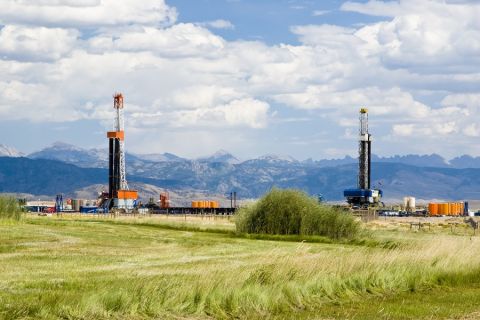
BP Technology Centre in Sunbury, U.K. (Source: BP Plc)
There can be no hiding from the wave of digital initiatives sweeping through every facet of the oil and gas industry, from advanced artificial intelligence algorithms that improve results from reservoir surveys, through intelligent well positioning to predictive maintenance strategies for pipelines.
For Rebecca Wiles, head of upstream technology at BP, one of the most critical factors underpinning the success of any digital initiative in the sector is an excellent physical understanding of the processes and technology. This has resulted in a change in focus when it comes to BP’s recruitment targets. The company still requires the core science and engineering backbone, but it also looks for people with broader skills.

“We do need people with data skills, but they must have a solid understanding of the physics that underpins our business, Wiles said. “We are also recruiting in data itself with more mathematicians and physicists joining the company.”
Dual Approach To Innovation
Along with the shift in staff profiles comes a realignment in BP’s approach to innovation. It has created a new digital function that sits alongside the traditional technology function, the pair working hand-in-hand to deliver future technology.
However, BP believes that success in research is not only about people and corporate structure, but also about nurturing the right environment that allows innovation to thrive. “We are focused not only on bringing in the right skills, but also creating an environment that allows those skills to flourish,” Wiles said.
“The technology organization is still focused on acquiring and coming up with new ideas and acquiring new data,” she continued. “An example here is with seismic imaging, where we are investigating autonomous underwater acquisition. The digital organization is taking ideas—some of the ideas will be from my technology team if it lends itself to a digital solution, but others could be from elsewhere in the organization.”
RELATED:
- The Need For ‘Smart’ Maintenance
- Applying AI To Production Operations
- Potential Of AI-powered Directional Drilling
Working A Different Way
Along with the digital thread that runs through entire organizations, there is a need to change work practices to become more agile, and that is the case at BP. One of the tools BP is using is “scrum technique,” which produces highly focused, cross-disciplined structures.
Scrum methodologies are all the rage in the current agile climate. The management philosophy is often used interchangeably with agile, but while scrum is certainly agile there are other methods of applying agile principles. Scrum is an agile method of iterative and incremental product delivery that uses frequent feedback and collaborative decision making.
“About half my team now is working in agile ways, with Scrums, or Kanban or Kaizen, all of those types of techniques to try and make it more exciting for the people that we are bringing into the company,” Wiles said. “Using agile techniques flattens the hierarchy. It creates a greater focus on big business issues. People are not undertaking multiple tasks; they are focused on one piece of delivery in a multi-functional team, and it is invigorating and exciting.”
It is difficult, if not impossible, for these agile Scrum teams to flourish inside the traditional rigid oil and gas management hierarchy. It requires a different type of leadership.
“No longer should we be telling people what to do, but we should be removing barriers,” Wiles explained. “We are calling it servant leadership. We are changing the way we work, focusing on digital agility and mindset, and just trying to create a fun environment. It is very visible leadership, and it is all about identifying any barriers that are preventing work moving forward and removing them instantly.
“People are finding this very empowering, and there was a noticeable buzz in the whole building around it. You cannot apply it to all pieces of work. It made sense to me, and it is invigorating, but you have to make sure you are applying the right techniques to the right type of work.”
Looking For Disruption
One of the questions that is often asked of technology leaders is to identify the next big technology that will shape the industry. BP has a team that is looking out as far as 2060 to try and get the jump on competitors.
“It is not just in our industry, but in other industries that could disrupt what we are doing,” Wiles said. “We do make investments in different ventures to try and understand exactly what is happening with them. If we believe we can bring some value to what they are trying to do, then we will link with them.”
Wiles pointed to two recent ventures that they have announced in the cognitive areas with Beyond Limits and Belmont Technology. Last summer, BP Ventures invested $20 million in Beyond Limits, an artificial intelligence (AI) and cognitive computing company. The company expects it would accelerate the delivery of industrial-grade AI software, previously used in deep space exploration missions, to combine human knowledge with machine learning and provide the energy sector with new levels of operational insight, business optimization and process automation across all operations.
Earlier this year, BP Ventures invested $5 million in Belmont to further bolster its AI and digital capabilities in its upstream business. The Houston-based technology start-up developed a cloud-based geoscience platform using AI. The platform has a string of unique capabilities including specially designed knowledge-graphs.
“Disruption can come from anywhere,” Wiles said. “You need to have your antenna out to make sure that you are collecting data and understanding what could be impacting our operations. Fundamental technology and the physics and the science behind what we do is still important.”
Recommended Reading
E&P Earnings Season Proves Up Stronger Efficiencies, Profits
2024-04-04 - The 2024 outlook for E&Ps largely surprises to the upside with conservative budgets and steady volumes.
Hess Corp. Boosts Bakken Output, Drilling Ahead of Chevron Merger
2024-01-31 - Hess Corp. increased its drilling activity and output from the Bakken play of North Dakota during the fourth quarter, the E&P reported in its latest earnings.
Petrie Partners: A Small Wonder
2024-02-01 - Petrie Partners may not be the biggest or flashiest investment bank on the block, but after over two decades, its executives have been around the block more than most.
CEO: Coterra ‘Deeply Curious’ on M&A Amid E&P Consolidation Wave
2024-02-26 - Coterra Energy has yet to get in on the large-scale M&A wave sweeping across the Lower 48—but CEO Tom Jorden said Coterra is keeping an eye on acquisition opportunities.
Endeavor Integration Brings Capital Efficiency, Durability to Diamondback
2024-02-22 - The combined Diamondback-Endeavor deal is expected to realize $3 billion in synergies and have 12 years of sub-$40/bbl breakeven inventory.






